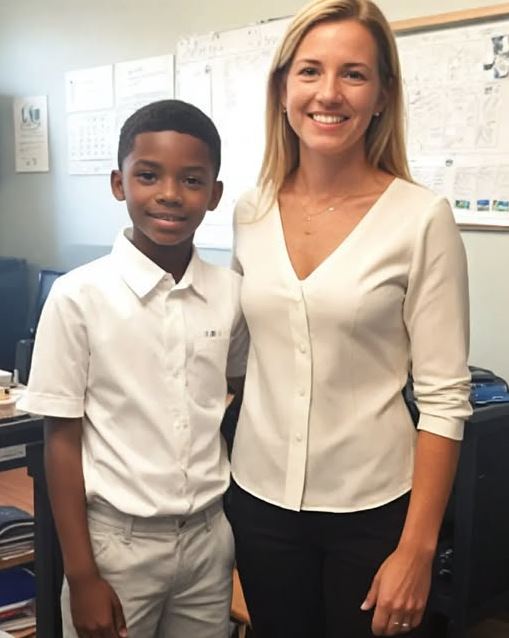When I first started teaching music at the school, everything felt overwhelming. I was still adjusting to the rhythm of the classroom, trying to find my footing with a group of energetic kids. That’s when I met Jay.
From the moment he sat at the piano, everything changed. The music that flowed from his fingers was unlike anything I’d ever heard — especially from someone so young and with so little formal training. I stood there, speechless, completely captivated. His talent was unmistakable.
I suggested private lessons, but he hesitated and eventually declined. I’d also noticed he kept to himself, rarely talking to the other kids. Something didn’t add up — I could feel there was more to the story. So I made a decision: I’d offer him lessons anyway, completely free.
Over the next several weeks, Jay and I played together almost every day. His progress was nothing short of incredible. He learned advanced pieces with ease, and his understanding of music deepened with each session. I knew he was ready to share his gift with others. He agreed, and we began preparing for his first performance.
But on the day of the concert, he disappeared.
After a frantic search, I found him backstage, hiding behind the curtains, pale and shaking.
“I have to go on… before my dad sees me,” he whispered.
I was confused. Why would his father be a problem?
Then Jay’s eyes locked on something behind me, wide with fear. I turned — and instantly understood.
Standing there in a perfectly tailored suit was Victor Marlowe.
A name I hadn’t heard in years.
Back in college, Victor and I had studied music together. But while I pursued passion, Victor chased perfection — and demanded it from everyone around him. He once humiliated me during a masterclass, saying in front of the entire room that I didn’t have what it took to be a real musician. That moment shattered my confidence. I gave up performing soon after.
Victor, on the other hand, went on to achieve worldwide fame. He became a celebrated concert pianist, traveling the world, releasing albums, and judging high-profile competitions. His talent was unmatched, but so was his ruthlessness.
And now, he was here. The father of my most gifted student.
“Mr. Clarke,” Victor said coolly. “What a surprise.”
Jay instinctively moved behind me, trembling.
“You never mentioned you were teaching my son,” Victor added, his tone polite but full of judgment.
I kept my voice calm. “Jay is incredibly talented. He’s put in a lot of work for tonight.”
Victor’s smile didn’t touch his eyes. “Jay’s not ready. I’ve trained him myself. He still has much to learn.”
Jay tugged on my sleeve. “Please don’t make me go out there,” he whispered.
And suddenly, it all made sense. Jay wasn’t afraid of the performance — he was afraid of failing in front of his father. The pressure, the fear of not being good enough — it was crushing him. Music had become a test, not a joy.
I knelt beside him. “Why do you play piano, Jay?”
His eyes brimmed with tears. “Because I love it. But when Dad’s watching, it doesn’t feel like mine anymore.”
I turned to Victor. “Let him perform — not for you, not for the audience, but for himself.”
Victor’s jaw clenched. “He’ll embarrass himself.”
“No,” I said, my voice firm. “The only real failure would be never giving him the chance.”
There was a heavy silence. Then Victor finally stepped aside. “Do what you want.”
Minutes later, Jay stepped onto the stage.
He hesitated, fingers trembling above the keys. Then he closed his eyes, took a deep breath — and began to play.
It wasn’t flawless. A couple of notes were off, and his timing wobbled once or twice. But none of that mattered. The music was honest. It was full of emotion, full of soul. Jay played not to impress anyone — but to express himself.
And when he finished, the room erupted in applause. Genuine, heartfelt applause.
Backstage, Victor stood quietly as Jay ran into my arms, smiling wider than I’d ever seen.
“You did it,” I whispered.
Victor approached slowly, his expression unreadable. “You played… differently,” he said.
Jay nodded. “I played because I wanted to.”
Victor paused. I expected a sharp remark — but instead, he nodded. “Maybe that’s what I’ve forgotten.”
In the weeks that followed, things began to change. Victor started attending Jay’s lessons — not to control, but to listen. He even asked for my input once, something I never thought I’d hear from him.
Jay continued to grow, both musically and emotionally. Free from the crushing weight of perfection, his love for music flourished.
And I learned something too: sometimes the most important thing a teacher can do isn’t to demand flawless technique — it’s to help a student find the courage to be imperfect. Because that’s where real artistry begins.
If this story touched your heart, please like and share it with someone who could use a little encouragement today.
